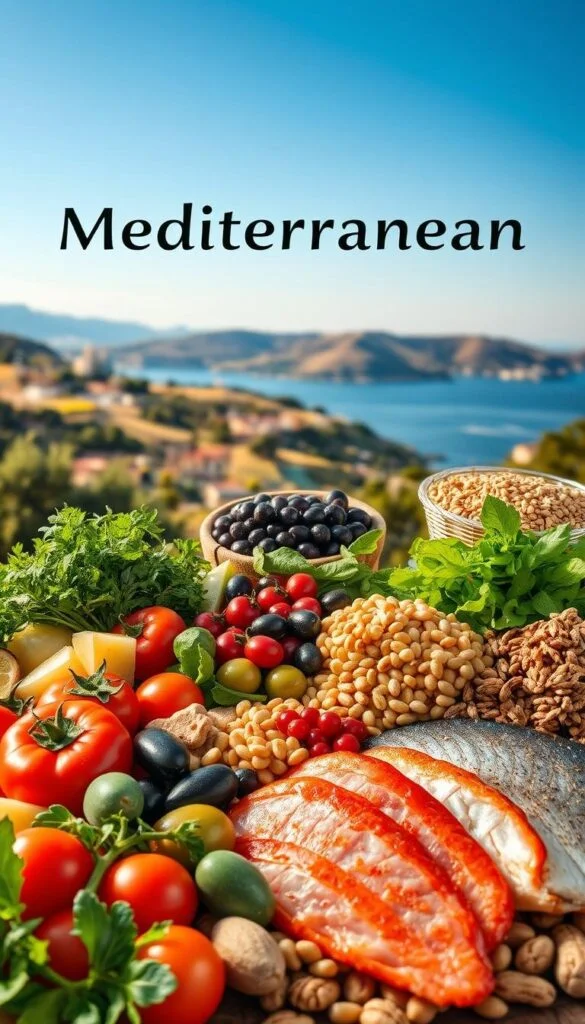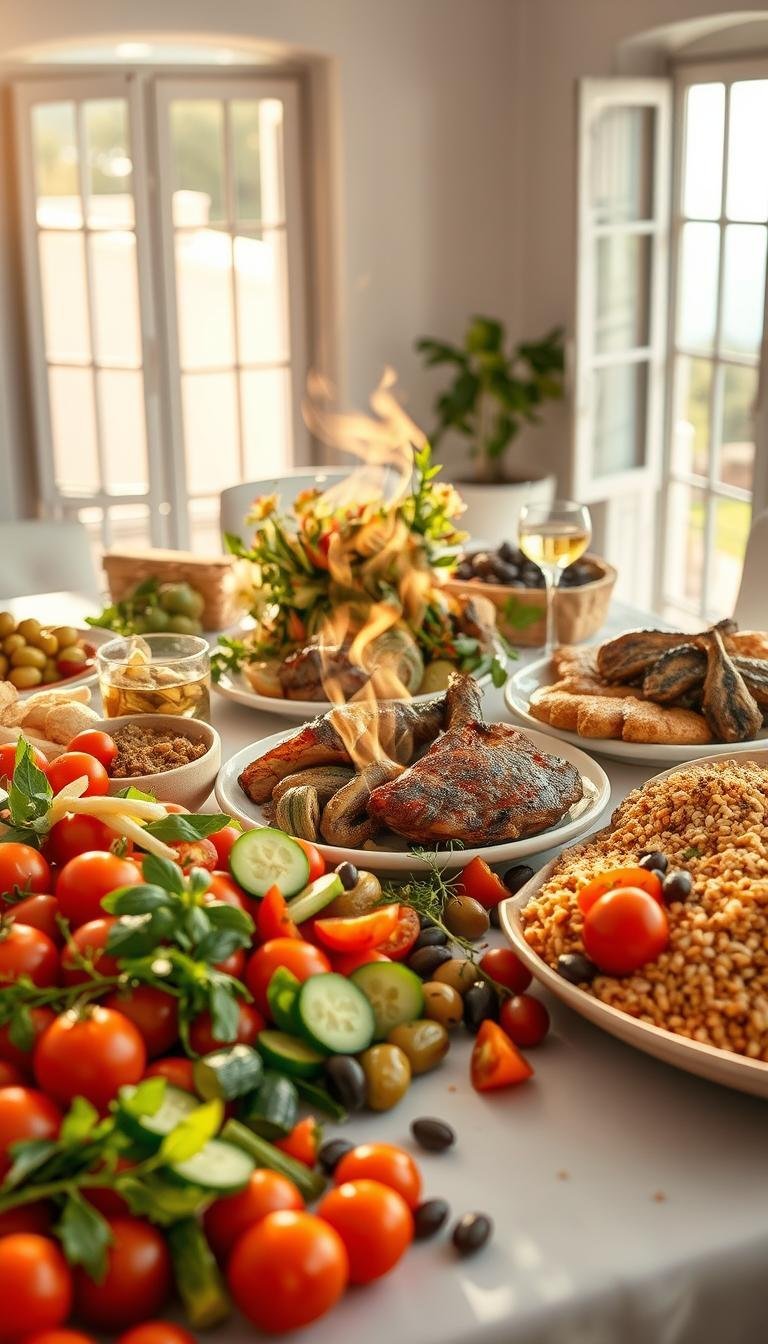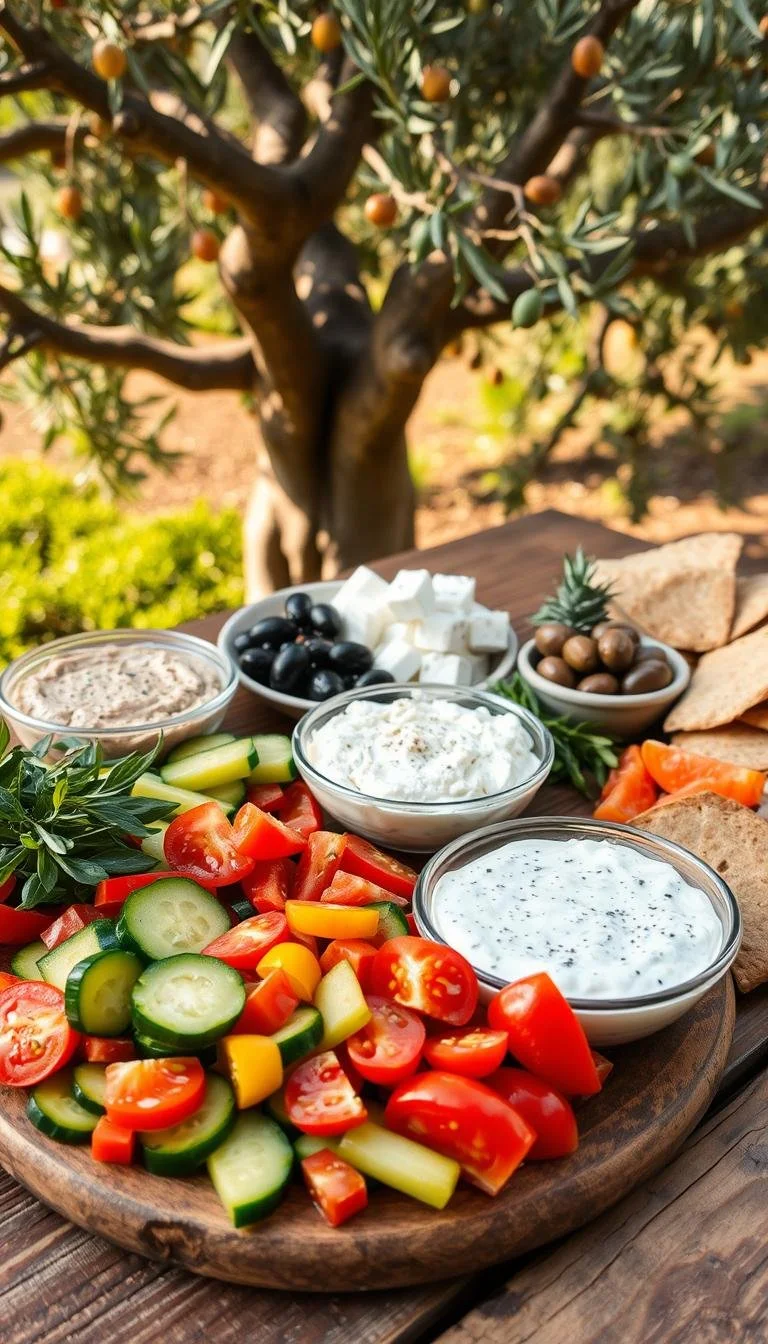(Hey! Some links in this post may be affiliate links — meaning I may earn a small commission if you buy through them, at no extra cost to you. As an Amazon Associate, I earn from qualifying purchases. I only share products I genuinely love and think you’ll find useful too. Read the full disclosure here).
Are you looking for a diet that’s both healthy and tasty? The Mediterranean Diet Meal Plan offers just that. It combines fresh flavors with healthy eating to boost your well-being. This guide is based on traditional foods from Greece and Italy.
This Mediterranean diet guide makes it easy to create balanced meals. It focuses on heart-healthy fats, lean proteins, and lots of fruits and veggies. You’ll learn how to cook delicious dishes without losing out on nutrition.
Whether you want to lose weight, increase your energy, or eat more mindfully, this meal plan fits your needs. The recipes show that eating well doesn’t mean sacrificing flavor. Each section of this guide will teach you how to shop, cook, and enjoy meals that follow Mediterranean principles.
Contents
- 1 What is the Mediterranean Diet?
- 2 Key Foods in a Mediterranean Diet
- 3 Sample Weekly Mediterranean Diet Meal Plan
- 4 Tips for Meal Prepping on a Mediterranean Diet
- 5 How to Incorporate Mediterranean Diet into Your Lifestyle
- 6 Delicious Mediterranean Diet Recipes
- 7 Understanding Portion Sizes
- 8 Common Myths About the Mediterranean Diet
- 9 Success Stories: Real-Life Transformations
- 10 Resources for Your Mediterranean Journey
What is the Mediterranean Diet?
The Mediterranean diet is more than a diet; it’s a way of life. It comes from the eating habits of countries near the Mediterranean Sea. It focuses on whole foods that are good for your body and mind.
By using natural ingredients and eating mindfully, it helps you stay healthy for a long time.
Principles of the Mediterranean Diet
The diet centers around Mediterranean diet foods like fresh veggies, fruits, whole grains, and healthy fats. Here’s why it’s special:
- Plant-based foods like leafy greens, legumes, and nuts are key.
- Olive oil is the main fat, not butter or processed oils.
- Fish and poultry are better choices than red meat, which is eaten less.
- Herbs and spices replace salt for flavor.
- Red wine is okay in small amounts, enjoyed with friends.

Nutritional Benefits
Research shows the Mediterranean diet has many benefits. It can lower heart disease risk, improve brain function, and help you live longer. The diet’s focus on antioxidants from colorful foods fights inflammation.
Healthy fats like olive oil are good for your heart. A
from the American Heart Association calls it “a proven strategy to reduce cardiovascular risks.”
By choosing whole foods and avoiding processed ones, this diet promotes balanced nutrition. It’s backed by science and easy to stick to!
Key Foods in a Mediterranean Diet
Starting a Mediterranean diet means knowing the right foods. A good Mediterranean diet grocery list helps keep your pantry stocked. Choose fresh, simple ingredients to follow this diet’s main principles.

Fruits and Vegetables
Fruits and veggies are full of vitamins, fiber, and antioxidants. Aim for 7–10 servings a day. Try:
- Leafy greens (spinach, arugula)
- Colorful berries and citrus
- Seasonal veggies like eggplant or zucchini
Add them to salads, soups, or as sides for a quick nutrition boost.
Whole Grains
Choose whole grains over refined carbs. Good options include:
- Bulgur
- Barley
- Whole wheat pasta
They offer steady energy and fiber. Use them in pilafs, bowls, or as a base for grain salads.
Healthy Fats
Healthy fats like olive oil, nuts, and seeds are key. Focus on:
- Extra-virgin olive oil for cooking
- Almonds, walnuts, and pistachios
- Avocados and fatty fish (salmon, sardines)
Use these fats every day, but in small amounts to keep calories balanced.
Sample Weekly Mediterranean Diet Meal Plan
Start your journey with this Healthy meal plan full of flavor and balance. Each day brings vibrant ingredients and simple dishes to make.

Breakfast Ideas
Begin your day with these quick and tasty options:
- Greek yogurt with walnuts, honey, and a sprinkle of cinnamon
- Whole grain toast with mashed avocado and a poached egg
- Spinach and feta frittata cut into wedges for grab-and-go
Lunch Options
Choose from these light yet satisfying meals:
- Chickpea salad with cucumber, olives, and lemon-tahini dressing
- Quinoa bowls layered with roasted veggies and hummus
- Grilled vegetable wraps in whole-wheat tortillas
Dinner Inspirations
Enjoy hearty meals with fresh flavors:
- Baked salmon with lemon and dill served over roasted asparagus
- White bean stew with tomatoes and a side of brown rice
- Grilled chicken kebabs with zucchini and red onion
Snack Suggestions
Keep your energy up with these snacks:
- Apple slices with almond butter
- Cucumber slices dipped in hummus
- A handful of mixed nuts or dried apricots
Adjust portions and ingredients to fit your lifestyle. This Mediterranean Diet Meal Plan is flexible and follows the diet’s main principles. Swap out proteins or veggies to match what you have at home or find at the market.
Tips for Meal Prepping on a Mediterranean Diet
Make healthy eating easy with Mediterranean meal prep. Smart strategies save time and keep flavors rich. Begin by planning a Mediterranean Diet Meal Plan for the week. Choose ingredients that work for many meals.

“The key to success with Mediterranean meal prep is simplicity and flexibility.”
Planning Ahead
Batch cooking is essential. Roast vegetables or cook grains like quinoa in advance. Store them in airtight containers for quick meals.
Before shopping, check what’s in season for savings. Include pantry items like canned beans or nuts for protein.
Storage Solutions
Get glass containers with snap-on lids for easy access. Freeze hummus or olives to keep flavors fresh. Freeze leftover chicken or fish for future meals.
Reheat grains in the microwave with olive oil for freshness. Label containers to track when they expire. Try new things with leftovers, like turning roasted veggies into frittatas or soups!
How to Incorporate Mediterranean Diet into Your Lifestyle
Starting the Mediterranean diet is easy with small steps. This Mediterranean diet guide helps you make easy changes. Focus on choices that fit your daily life.
Shopping Tips
First, make a Mediterranean diet grocery list by store sections. Focus on fresh veggies, canned beans, and olive oil. Buy seasonal items on sale to save money.
- Shop farmers’ markets for fresh veggies and fruits.
- Choose whole grains like farro or bulgur for meals.
- Save time with frozen fish or pre-marinated tofu.

Cooking Techniques
Learning simple cooking methods is key. Here’s how:
- Roast vegetables with olive oil and spices for quick sides.
- Use dried herbs (oregano, thyme) for flavor without salt.
- Simmer lentils or chickpeas with tomatoes for tasty soups.
Slowly make changes. Start by replacing one meal a day with Mediterranean dishes. Soon, these choices will become a natural part of your life.
Delicious Mediterranean Diet Recipes
Bring the vibrant flavors of the Mediterranean to your table with simple, nourishing dishes. These Mediterranean recipes use fresh ingredients like olive oil, herbs, and seasonal produce. They are the heart of Mediterranean diet foods. Each dish combines tradition with a modern twist, making them perfect for any meal or occasion.
Flavorful Appetizers
Spark your appetite with these shareable bites:
- Baba Ganoush: Creamy roasted eggplant blended with garlic and lemon
- Dolmas: Stuffed grape leaves with herbs and rice
- Marinated Olives: A mix of black and green olives with lemon and oregano
Satisfying Main Dishes
Hearty meals packed with protein and veggies:
- Moroccan Chickpea Tagine: Slow-cooked with apricots and cumin
- Seafood Paella: Saffron rice with shrimp, mussels, and peas
- Lentil Moussaka: A meatless version with eggplant and tomato sauce
Delectable Desserts
Sweet treats that stay true to Mediterranean principles:
- Honeyed Fruit Platter: Mixed berries drizzled with honey and mint
- Cheesecake with Fig Compote: A lightened version using Greek yogurt
- Orange Semolina Cake: Baked with olive oil and orange zest
Adapt these Mediterranean recipes to your taste—swap proteins, adjust spices, or use pantry staples. Every dish celebrates bold flavors without compromising health. Share these meals with friends or savor them solo—cooking Mediterranean is an adventure anyone can enjoy.
Understanding Portion Sizes
Portion sizes are key in the Mediterranean diet for weight loss. Making small changes in how much we eat can make a big difference. Let’s learn how to balance our plates and enjoy our meals more.
Healthy Serving Suggestions
Traditional Mediterranean meals are all about balance. Here’s what to aim for:
- Protein: 3-4 oz (like grilled fish or tofu)
- Vegetables: Half your plate, raw or roasted
- Whole grains: A fist-sized portion (e.g., quinoa, farro)
- Fats: 1 tbsp olive oil or ¼ avocado
Compare this to typical American portions. Mediterranean servings focus on nutrients, not size.
Mindful Eating
Eating slowly makes us feel fuller. Try these tips:
- Pause before eating to check if you’re hungry.
- Chew well, enjoying each flavor.
- Use smaller plates to match serving sizes.
- Share meals with others to slow down eating.
“In Mediterranean cultures, meals are moments of connection—not quick fixes.”
Combine mindful eating with a healthy meal plan to reach your Mediterranean diet goals. Small, thoughtful choices lead to lasting habits.
Common Myths About the Mediterranean Diet
Many myths about the Mediterranean diet stop people from trying it. Let’s clear up these myths and focus on its benefits and how it works in real life.
Clarifying Misconceptions
Myths like “it’s too expensive” or “only for certain cuisines” are common. Let’s debunk them:
- Myth: The Mediterranean diet requires exotic ingredients. Reality: It uses everyday foods like tomatoes, olive oil, and whole-grain bread. No rare items needed.
- Myth: It’s high in carbs from pasta and bread. Truth: These are part of the diet but eaten in moderation. Focus stays on vegetables, fish, and healthy fats.
- Myth: It can’t help with weight loss. Studies show the Mediterranean diet benefits include sustainable weight management when balanced with activity.
The Importance of Balance
A Mediterranean diet guide emphasizes flexibility, not strict rules. Enjoyment and balance matter most. As nutritionist Joan Smith notes:
“This diet isn’t about restriction—it’s about savoring good food while prioritizing plant-based choices.”
Incorporate favorite dishes but pair them with vegetables and mindful portions. Small indulgences fit into this lifestyle when paired with daily movement and mindful eating.
Success Stories: Real-Life Transformations
Real people across the U.S. have changed their lives with the Mediterranean diet. Here are their stories:
Testimonials from Adopters
- A 45-year-old teacher lost 30 lbs in 6 months using the Mediterranean diet for weight loss, reducing blood pressure without medication.
- A retired engineer with type 2 diabetes stabilized blood sugar levels by swapping processed snacks for nuts and olive oil.
- A busy mom of three increased energy levels by meal prepping Mediterranean-inspired lunches, sharing on social media how it simplified family dinners.
Expert Insights
“This diet isn’t a quick fix—it’s a sustainable lifestyle. Studies show it lowers heart disease risk and inflammation markers,” says Dr. Elena Torres, a registered dietitian at Johns Hopkins Medicine.
Research from the NIH confirms Mediterranean diet benefits extend to mental health, with participants reporting reduced stress. These stories reflect a common theme: gradual changes like adding more vegetables or swapping butter for olive oil create lasting results. Nutritionists advise focusing on progress, not perfection, to avoid burnout.
These examples prove the Mediterranean approach works for varied lifestyles. Whether aiming for Mediterranean diet for weight loss or better overall wellness, these journeys inspire confidence in its versatility and health impact.
Resources for Your Mediterranean Journey
Starting your Mediterranean lifestyle is easier with the right tools. Check out these trusted resources to keep your journey fresh and supported.
Cookbooks and Blogs
Start with Mediterranean Diet Guide: A Complete Cookbook from Oldways. It mixes tradition with modern twists. Blogs like The Mediterranean Dish share family-friendly Mediterranean recipes.
Oh She Glows makes plant-based dishes fit the diet. Subscribe to Harvard T.H. Chan’s nutrition updates for science-backed insights.
Online Communities and Forums
Join Facebook groups like Mediterranean Lifestyle Collective or Reddit’s r/MediterraneanDiet for recipe swaps and tips. Use apps like MyFitnessPal’s Mediterranean meal plans to track progress. Virtual cooking classes from brands like MedDish or Gastronomy offer hands-on learning.
Whether you like cookbooks or forums, these resources keep inspiration near. Start with one recipe, explore a blog post, or join a group chat. Every connection and tool helps make commitment a routine. Let curiosity guide you—there’s no wrong way to embrace this vibrant way of eating.








